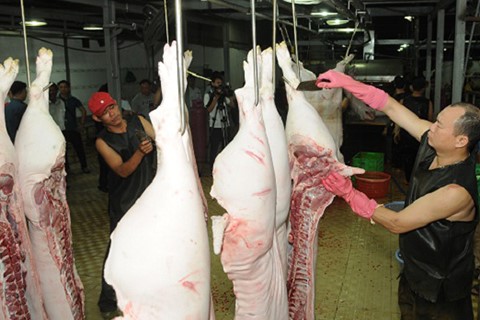
A slaughterhouse in HCM City. The city has encouraged businesses to buy healthy pigs and stockpile frozen pork to prepare for potential shortages caused by the spread of African swine fever. — VNA/VNS Photo Manh Linh
Viet Nam is expected to import more pork in the coming months to make up for domestic shortages as African swine fever continues to spread, according to the Ministry of Industry and Trade (MoIT).
MoIT’s Centre for Industry and Trade Information said pork is being sold at unusually low prices because of lower demand.
Pork prices dropped to between VND25,000 (US$1) and VND34,000 per kilo in the north, down VND3,000-VND6,000 from the previous month. Prices in the south were VND35,000 per kilo, down VND5,000-VND10,000.
The ministry said pork supply has been limited as some 1.5 million pigs were culled in the first four months of the year, accounting for 5 per cent of all the country's pigs.
African swine fever has been detected in 53 cities and provinces. The epidemic was expected to continue spreading to other localities. Some provinces that had eliminated the disease saw outbreaks return and the disease could still spread to large-scale breeding farms.
According to Rabobank, a global leader in food and agriculture financing and sustainability-oriented banking, Viet Nam’s pig breeding industry has been under increasing pressure due to the disease.
In its report in the second quarter of the year, Rabobank said Viet Nam's pork meat output in 2019 would be reduced by at least 10 per cent.
Despite the Government’s efforts to control the disease, new cases have still been discovered. Rabobank said falling production would reduce the per capita pork consumption of Vietnamese people by up to 7 per cent.
MoIT has asked provincial industry and trade departments nationwide to closely monitor the disease and report back on the processing and storage of safe pork.
HCM City has encouraged businesses to buy healthy pigs and stockpile frozen pork to prepare for potential shortages.
According to the municipal Department of Agriculture and Rural Development, the disease is not present in the city but has been detected in many other southern localities. HCM City is a major market for pork, meaning it could be seriously affected if the disease arrives.
The municipal People’s Committee has been working with wholesale meat providers such as CP, Vissan, San Ha and Ba Huan to prepare large amounts of safe pork to ensure the city's demand – 147 tonnes of pork per day – can be met.
Pham Thanh Kien, director of the city’s Department of Industry and Trade, said the city has so far ensured adequate pork supply. However, it still encourages businesses to stockpile meat. — VNS